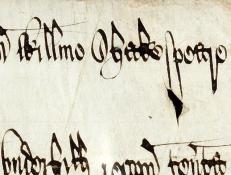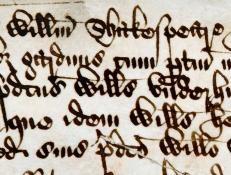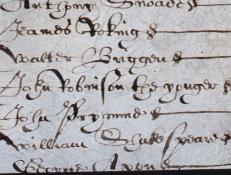To view a sortable list, please visit the Resource
All Documents
August 11, 1596
Hamnet, William and Anne Shakespeare’s only son, was buried on August 11, 1596, according to the Holy Trinity Church parish register. Next to the entry, an “X” added by a later hand highlights its significance. He was eleven years old.
November 29, 1596
The enrolled entry known to Shakespeare scholars as the “Langley writ” was recorded in the Court of King’s Bench between October 29, 1596 and January 24, 1597. The writ constitutes presumptive evidence that William Shakespeare, formerly of St.
November 15, 1597
Lay subsidies were a type of tax based on personal wealth. In London, the collection of subsidies was managed at the local level of ward and parish. Each collection typically generated one lay subsidy roll and one default roll for each ward.
May 4, 1597
For further details about the 1597 exemplification, see the general essay for Shakespeare's purchase of New Place.
1597
For details about the 1597 foot of fine, see the general essay for Shakespeare's purchase of New Place. The foot has a useful endorsement (the second image) recording the occasions when the final concord was "proclaimed" in open court, as requi
May 8, 1597
In May 1597, the freehold title to New Place passed from William Underhill to William Shakespeare. This would normally have been recorded in a formal deed of conveyance, signed by the both parties.
May 2-9, 1597
In May 1597, the freehold title to New Place passed from William Underhill to William Shakespeare. This would normally have been recorded in a formal deed of conveyance, signed by both parties.
1598
The borough chamberlain, in his accounts submitted in January 1598, included an entry that at some point in the previous twelve months he paid “Mr Shaxpere” 10 pence for “on lod of ston,” one of a set of five payments made towards the repair of the bridge over t
January 24, 1598
In this letter, dated January 24, 1598, Abraham Sturley wrote to fellow Stratford townsman Richard Quiney about several town matters, including a rumor regarding Shakespeare’s intent to purchase land.
October 1, 1598
Lay subsidies were a type of tax based on personal wealth. In London, the collection of subsidies was managed at the local level of ward and parish.


![The Langley writ [1], thumbnail detail](https://shakespearedocumented.folger.edu/sites/default/files/styles/document_thumbnail/public/document-thumbnails/KB29-234%20%281%29_thumbnail%20detail.jpg?itok=2LLnnL-2)












